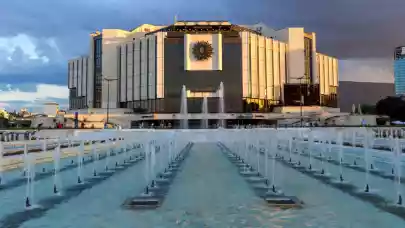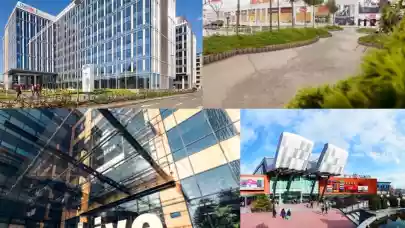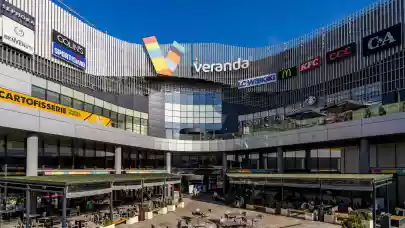
Stable rents and yields unscathed by increasing supply of office and industrial space – this is what Cushman & Wakefield Forton expects to see on the Bulgarian commercial property market in 2019, according to the company’s latest forecast.
After a period of strong growth, the present year could be affected by an anticipated slowdown of economic growth and the gradual evolution of interest rates. However, the effect thereof is unlikely to be evident during the coming months sustaining a period of stability, according to the consulting company.
“If activity amid the key economic sectors is kept, this year is projected to be relatively calm for the commercial property market. Although this will not be forthwith evident, the trend in some segments is turning course, i.e. from shortage to enhanced supply of space on offer. In a medium-term this will influence occupancy and prevent further rental growth, so we advise the investors and developers to watch the market closely”, commented Michaela Lashova, Managing Partner at Cushman & Wakefield Forton.
A more positive development is emerging on the retail market, where the growth of consumption sustains retailers’ interest for expansion. Developers' focus is shifting from shopping centres to retail parks in second and third-tier regional centres.
Office market
As to the end of 2018, the office space under construction in Sofia is nearly 440,000 sqm, of which approximately 100,000 sqm have obtained building permits during the recent months. The significant growth of buildings under construction is a reaction to the prolonged shortage of high-standard office space for rent in an environment of active demand during the last years.
“The demand for high-standard office space is still strong taking into consideration the continuing activity of the IT and BPO industry, which is a key driver of the rental market. Therefore, we do not expect any significant upheavals in 2019, but the increased supply will definitely be a challenge for the market in a medium turn”, forecasted Stanimira Pashova, Manager Office Space at Cushman & Wakefield Forton.
Based on data of the company, nearly 240,000 sqm new offices are to be finished until the end of 2019, and over 40% of this space has been pre-let. The expectations are for the gradual growth of unoccupied space in the following years. As to the end of 2018, the share of vacant offices in Sofia ranges within 9.-9.6% and no sharp increase is emerging in the next year.
With the release of new offices of high quality on the market, the expectations are that the share of leased space under construction will remain high to the detriment of the older buildings of the lower class.
For now, the rents are not under any serious pressure and the expectations of Cushman & Wakefield Forton are that they will remain at the levels reached in 2018. For Sofia, this means €15/sqm/month asking rents for prime-class space in the CBD and €12-14/ sqm/month for high-class offices on the main boulevards.
Retail market
The development of retail parks will be a key trend in 2019. Developers’ interest is related to the expansion of many retailers in the medium and small towns with a population from 30,000 to 100,000 where there are no shopping centres.
„In the second-tier cities, there is lack of economic grounds for investing in a large-scale shopping centre. Retail parks remain a feasible option for brands wishing to expand to these locations. Typically, those projects are in the range of 5-6,000 sqm leasable area, most of which developed near existing anchor schemes such as food chain retailers, electronics stores or Do-It-Yourself stores”, summarized Ivan Gramatikov, Manager Retail Space at Cushman & Wakefield Forton.
Taking into consideration that the development of such a project takes within 6 to 10 months, new projects should be expected to appear on the market at the end of 2019.
After the opening of Plovdiv Plaza and the forthcoming launch of Delta Planet Varna at the end of March, the market for retails space in the big cities has already become saturated. Having said that, in the shopping centre segment, new projects are not expected in the coming years. By the middle of 2019, the total supply of shopping centres space across the country will exceed 810,000 sqm.
Shopping centre and main street rents in Sofia will continue their gradual increase throughout 2019. As to the end of 2018, they reached €34/ sqm/month for a premise of 100-150 sqm at a key location in a big shopping centre and €52/sqm/month for a similar premise on a main street.
Affordable fashion will be the new key player in the retail sector, where newcomers such as Pepco, KiK Textilien, etc. are expected. Many of the brands already presented on the market are also in expansion mode, as a result of the growing sales during recent years.
Industrial market
With the completion of approximately 150,000 sqm of storage and production space in 2018 and yet another 160,000 sqm under construction, the industrial property market in Sofia has gradually overcome the long-run shortage of modern space. Nevertheless, the share of speculative projects is still small, and just 50,000 sqm have been brought to the market in 2018.
“Most of the speculative projects were pre-let during the construction phase and that gave developers the confidence to launch further stages of their projects. Meanwhile, several big scale tenants have built their own facilities and in turn, vacated the properties occupied by them until that point. These factors settle the vacancy rate in Sofia from 2-3% in 2018 to approximately 5% in 2019, which is a healthier place to be”, forecasted Vladimir Gurdjieff, Head of Industrial space and Land development at Cushman & Wakefield Forton.
According to him, the vacancy rate and increasing supply are proof of a mature industrial market. His expectations are that this will stabilize the rental prices at approximately €4-4.20/sqm/month for medium to a big volume of storage space in Sofia.
The market of industrial space outside Sofia remains active mainly due to the demand of production space for automotive parts and electronics. Bulgaria is attractive thanks to the lower operating costs and available resources on the labour market. In this regard, opportunities are emerging in the north-central part of the country, where new production facilities are being established as we speak. Also, we witness a new trend where production companies no longer avoid Sofia and scout the capital area because of the higher educated talent pool and better infrastructure. Several large scale and technologically advanced production facilities are expected to open quite soon.
Investment market
The investment property market remains liquid continuing the trend observed over the last two years. For both local and international funds, commitment to increasing capital in the region arrives as a meaningful and strategic long-term play.
“Throughout the past two years, we have witnessed a notable number of large transactions with opportunistic and traditional investors in Bulgaria. The focus on prime assets with stable cash flows especially in the office segment remains strong. At the same time, a large portion of the increasing interest is framed by value-add investors looking for properties with growth potential. Although growth in the interest rates is anticipated, the financing conditions remain quite appealing and the risk profile of the country is still overstated which suggest higher returns in all asset classes”, commented Yavor Kostov, manager Capital Markets at Cushman & Wakefield Forton.
According to him, all of the market segments present opportunities for new potential acquisitions, however, provided that the sellers act reasonably in seeking price and profitability. As to the end of 2018, the yield levels of prime-class office space remain approximately 7.75%, 7.25% for retail space and 8.75% for industrial properties.
In terms of location preferences, the interest in buying office buildings and industrial properties is focused on the capital, while opportunities for new acquisitions of retail space are emerging for well-performing shopping centres in second-tier locations throughout the country.



